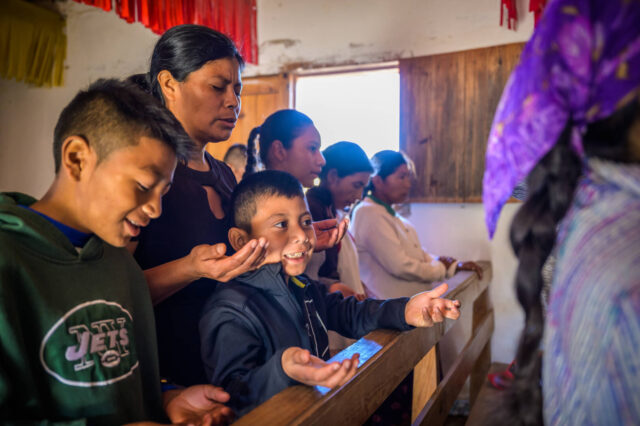We’ve compiled 10 fun games your family can play that help kids learn how to pay it forward and give them the confidence that they are never too young to change the world:
- Water walk — Learn what it takes to get water for your basic needs.
- Color spray dodgeball — Spend some time enjoying all the colors God made in the world.
- Food find — Learn about the causes of hunger and interesting solutions to food shortages.
- Quick escape — Discover what choices you’d make if you were a refugee.
- Soup share — Find out how sharing and working together make us greater than the needs we all face, and try our soup recipe.
- Birthday survival — Learn about the special health challenges for kids younger than 5.
- Hard day’s work — Learn how some kids have to work instead of going to school.
- Gift-giving — Learn how unique gifts make a special difference for the giver and receiver.
- Choice dare — Learn about the choices children in poverty have to make.
- DIY toy build — Learn how kids without toys make their own and how you can too.
1. Family activity: Water walk
Water is used in many more ways than we even realize. The average American family uses more than 300 gallons per day at home. Think of the ways we use water:
- Teeth brushing: 1 gallon
- Flushing the toilet: 2 gallons
- Shower: 5 gallons per minute
- Dishwasher: 6 gallons
- Drinking: 1/2 gallon per person
Water is fundamental to life. What if our access was cut off? Imagine all the ways our daily routines would change. How much water does your family use? How many times would you have to go to the river or waterhole to get dirty water? The risks are huge — every day nearly 1,000 children die from diarrhea due to poor water, sanitation, and hygiene. But what is a mother to do if she has no alternative to dirty water?
Learn what it takes to get water for your basic needs. Play outside if possible. If you need to play inside, use a non-carpeted room, put down towels, and have a mop on hand to clean up spilled water. Expect to get wet! What you’ll need:
- 2 buckets (or large mixing bowls)
- 2 large sponges (or plastic cups)
- Towels
Play the game with your family
Place the buckets about 15 feet apart. One bucket is “home” and the other is the “watering hole” where you get the water. Your goal (either as one team or divide into teams and make it a race; just double your materials) is to bring water home — by carrying it in a sponge on your head, with no hands!
Place the empty sponge on your head at home and walk to the watering hole. Once there, take the sponge off your head, put it in the bucket, and let it soak up as much water as it can. Then put the full sponge on top of your head, remove your hands, and walk back home. Squeeze the water from the sponge into the bucket using your hands and give the sponge to the next person, who will repeat the steps. Continue until the watering hole is empty!
If at any time the sponge falls off your head, return to the line you left and start over. If you drop it on the way to the watering hole, start back at home. If you drop it on your way home, start back at the watering hole.
Play it forward: What did you learn?
How long did it take you to get all the water home? How would life change for someone who went from traveling hours each day to a watering hole to having easy access to plentiful, clean water? Watch Cheru’s story:
Now use what you learned playing the game to pay it forward. Look for water walks in your city or start one yourself! World Vision hosts the annual Global 6K for Water each spring. Six kilometers is the average distance people in the developing world walk for water, which is often contaminated with life-threatening diseases. Last year, more than 52,000 people in 22 countries walked for water so children around the world don’t have to.
You can also host a lemonade stand — like Tyler did — with fresh, clean water to raise funds for kids who don’t have water.
2. Family activity: Color spray dodgeball
Imagine waking up one morning to discover that all the color in the world had disappeared. Everything would be black, white, and shades of gray. What colors would you miss the most? We are going to celebrate the vibrant colors within God’s creation by having a colorful game of water balloon dodgeball! What you’ll need:
- 2 large buckets or bowls
- Small water balloons
- Cold water
- Cornstarch
- Neon food coloring
- Spray bottle(s)
- A rope or ribbon to make a long line in the grass
- Colorful fruits, vegetables, and juices for snacks
Play the game with your family
Play outside and wear clothes you don’t mind getting dirty. You can prepare the colorful water balloons ahead of time or make this a part of the activity with your kids. Here’s how to make them:
- Combine 2 cups cold water, ¾ cup corn starch, and 10 drops of one color of food coloring in a saucepan.
- Heat over medium heat, stir constantly, and stop as soon as the liquid begins to thicken (you don’t want it to get too thick!).
- Add the liquid to a spray bottle. Attach a balloon to the nozzle of the bottle, and squirt the liquid into the balloons until full.
- Repeat with other colors until you have the desired amount of water balloons.
Outside, place a rope or ribbon across the yard to divide it into two sides. Divide into two teams, and give each team the same number of water balloons. Count to three and yell, “GO!” All the team members race to the line and throw balloons at their opponents.
Play for fun, or play to win: If someone gets doused with color, they’re out. If the balloon hits them and does not break, the thrower is out. The team that survives the longest wins.
Play it forward: What did you learn?
After the family game, gather for snacks and refreshments, and take some time to talk about the game.
Color is such a beautiful blessing. How do you think your day-to-day life would be different if you woke up one day to a world without color? How would you rely on your other senses to make up for the lack of color?
In the beginning, God had a blank canvas before him. He could have created a colorless world — or even a world with only a couple of colors in it. But he didn’t! His love of color is written on the petals of flowers, the blue of the sky, and the skin of all people across the world. Why do you think he did this? If colors are from God, and God is good, is there such a thing as a bad color?
What’s next? Find a color run near you, raise funds, and donate them to your favorite charity. You can also bless your loved ones with the gift of color by painting them a picture, giving them a hand-picked bouquet of flowers, or cooking for them a beautiful, colorful meal, utilizing colorful produce and spices available at the local market.
3. Family activity: Food find
The world produces enough food for everyone to have enough. Yet, nearly one in every 11 people in the world does not have enough to eat. Why?
Some people can’t grow enough food. Many poor farmers are unable to grow enough food to feed their own families. Sometimes it’s because they don’t have the money to buy good seeds. Sometimes it’s the weather — not enough rain or too much rain can ruin gardens and crops they’ve planted. Sometimes it’s because disease harms the crops they are trying to grow. Sometimes it’s because they may grow enough food for part of the year but lack safe storage to save food for the cold or dry seasons when they can’t grow food.
People who don’t grow their own food often go hungry because they lack the money to buy food. And nutritious food is more expensive than unhealthy, processed food.
Learn why it is hard for some kids to get enough food to eat. You’ll need three to five food items you will hide for each child playing to find, i.e. banana, apple, orange, an ear of corn, carrot, a bag of rice, bread in a sandwich bag, etc.
Play the game with your family
(Hide all the food items before you start the family activity.)
Tell your kids the number of food items you’ve hidden, and give them a time limit to find them based on their age and how well you’ve hidden the items! After they find them all, come back together.
Play it forward: What did you learn?
Sit down for a discussion with your kids: How did you feel when you found the hidden food? Was it easy or hard? Think about the last time you were hungry. What happens to you when you’re hungry? Do you ever get “hangry?”
Then learn more about how World Vision is fighting hunger around the world, and consider donating to help.
You can also learn more about how local organizations are helping hungry people in your community. Find out what your local food bank needs, and add those items to your grocery list this weekend. Or provide a donation for a family food kit that will feed a family in the U.S.
4. Family activity: Quick escape
The goal of this game is to differentiate between wants and needs, as well as imagine the choices refugees make. What you’ll need:
- A representative item for each item on the packing list
- Backpacks or bag big enough for all items on the packing list
Play the game with your family
Mission Control has discovered a new planet, and our family gets to go! Close your eyes for a minute and imagine: How will we get there, what will it look like, and who will we meet? Okay, open your eyes. What’s similar and what’s different about what each of us imagined? Now let’s pack our 15 items to bring:
- Food
- Candy
- Water
- Music
- Movies
- Books
- Toys and sports equipment
- Money
- Clothing
- Clean air
- Bed
- Medicine
- Family
- Computer
- Phone
Wait! Mission Control has just limited our cargo space to 10 items. What do we want to take and what do we need to take? Take out five items.
Uh-oh. An emergency announcement just came through that there is even less space available. We can only take seven items. Take out three more items.
We should now have only the items that are essential for survival. What do you think? What was easy about choosing what to leave behind? What was harder?
Play it forward: What did you learn?
Discuss the difference between want and need. What does a person truly need to survive? What would you take if you had to leave your home because war broke out and it was too dangerous to stay? Millions of families have had to make that choice. They are called refugees.
What do you know about refugees? Learn more about the Syrian refugee crisis and watch this video about a family making decisions about what they would take with them.
Prayer matters. Here are some prayer ideas:
- Heavenly Father, help refugee families get the food, water, and medicine they need. Protect them from the fighting around them.
- Prince of Peace, take care of refugee children. Help them find safe homes and access to school. Help their parents find jobs to take care of them. Heal them of scary memories.
Your kids can also give part of what they earn from this week’s allowance or chores (or see how much they can earn to donate) to help people in tough situations around the world:
- $10 to feed a refugee child for a week
- $12 to share the story of Jesus and the glory of God’s work by providing a Bible
- $16 for two soccer balls
5. Family activity: Soup share
Sometimes we all, especially children, feel like we can’t make a difference with the little we have. We hesitate to share what we have because we think we’ll lose. But even the smallest of contributions together multiply so everyone gets more back than what they contributed. Learn about the importance of sharing and contributing to the greater good through this story about stone soup — and learn how to make it! What you’ll need to feed six to eight people:
- Large pot
- 3 medium-sized stones, washed clean
- 1 tablespoon oil
- 1 onion, diced
- 4 cups vegetable stock
- 1/2 cup peanut butter
- 2 cups fresh or canned tomatoes with juices, diced
- 1/4 teaspoon crushed red pepper flakes
- 1 cup cabbage, finely chopped
- 1 cup sweet potatoes, peeled and chopped
- 1 cup carrots, peeled and chopped
- 1 cup turnips, peeled and chopped
- 1 cup okra, chopped
- 1 to 2 cups cooked chicken, chopped
- Salt and pepper to taste
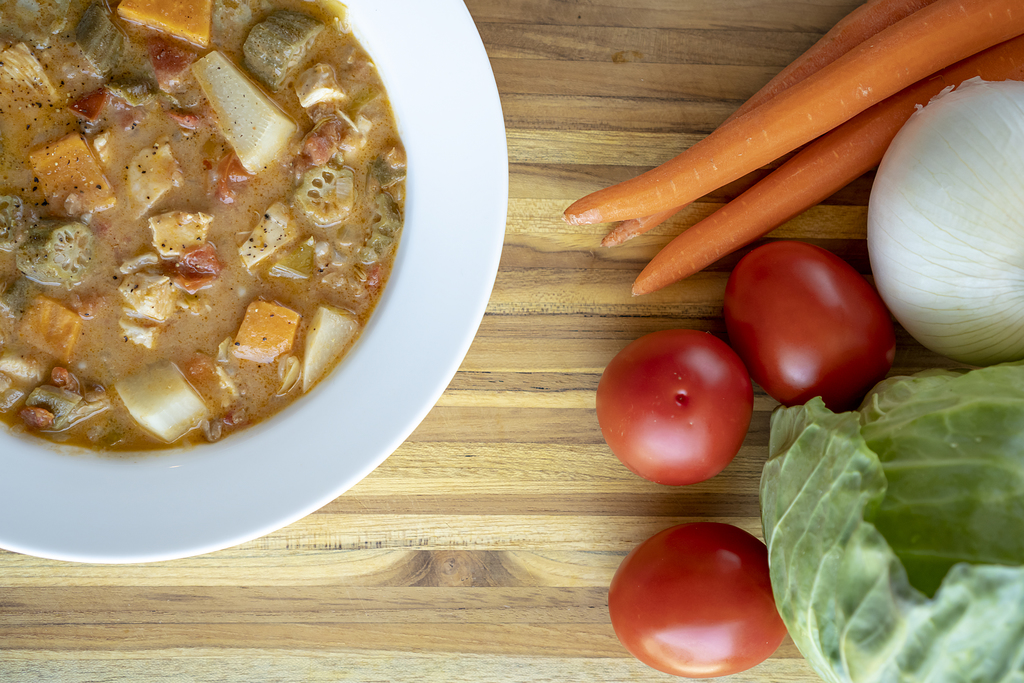
Play the game with your family
Read the following story about stone soup.
Three travelers walked slowly down a road in a strange country. They were tired and hungry. They had eaten nothing for two days.
“I would like a good dinner tonight,” said the first. “And a bed to sleep in,” added the second. “But that is impossible,” said the third.
Soon they saw a village. “Maybe we’ll find a bite to eat and a bed to sleep in,” they thought.
When the villagers heard that three strangers were coming, they were worried. “Here come three strangers,” they said. “Strangers are always hungry. But we have so little for ourselves.” So, they hid all their food.
The travelers stopped at a house. “Good evening,” one said. “Could you spare a bit of food?” one asked. “And do you have a corner where we could sleep for the night?”
“Oh, no,” the man lied. “We have nothing to share.” Then the woman lied, “And our beds are full.” At each house, the response was the same.
The travelers talked together. The first one called out, “Good people! We are three hungry visitors in a strange land. We have asked you for food, and you have no food. Well, we will have to make stone soup.” The villagers stared.
The travelers asked for a big iron pot, water to fill it, a fire to heat it, and three stones. They dropped the stones into the pot.
[Take out the pot and drop in the stones.]
“Any soup needs salt and pepper,” the first one said, so some children ran to get salt and pepper. “Stones make good soup, but carrots would make it so much better,” the second traveler added. A woman replied, “Why, I think I have a carrot or two!” She ran to get the carrots. “A good stone soup should have some potatoes,” said the third traveler. Another woman said, “I think I can find some potatoes.” And off she went. The travelers said, “If only we had a bit of barley, this soup would be fit for a king!” And so another villager found some barley.
“The soup is ready,” said the travelers. Tables were set up in the square, and all sat down to eat.
Never had there been such a feast. Never had anyone tasted such delicious soup made from stones! The mayor offered beds at his home for the travelers. In the morning, the villagers gathered to say goodbye. “Many thanks to you,” the people said, “for we shall never go hungry now that you have taught us how to make soup from stones!”
Now let’s finish making our stone soup! (Feel free to remove the stones first.)
- Heat oil in a large pot over medium heat.
- Sautee onions about 5 minutes or until translucent.
- Whisk 1/2 cup of the vegetable stock and all the peanut butter into the onions until the mixture is smooth.
- Add in the remaining vegetable stock, diced tomatoes with liquid, and red pepper flakes. Bring mixture to boil.
- Reduce heat to medium-low, cover, and simmer for 30 minutes.
- Stir in cabbage, sweet potatoes, carrots, and turnips. Cover. Simmer, stirring occasionally, for 30 minutes or until vegetables are tender.
- Stir in okra and chicken. Simmer until okra is tender (about 30 minutes for raw or 10 minutes for canned).
- Season with salt and pepper to taste. Then enjoy!
Play it forward: What did you learn?
Why did you each of you like or dislike the story? What made the soup taste good? How did the villagers change while the soup was cooking? What is the story’s message? Why is sharing important — and what happens when people don’t share?
Read John 6:5-13, the story of Jesus feeding the 5,000 with the loaves and fishes offered by a little boy. What happened when the little boy shared what he had? How did Jesus use the boy’s gift? How do you think the boy felt when he saw so many people fed because he shared?
Then brainstorm ideas on how you can share this week. What about volunteering as a family to feed people in need at a local shelter or soup kitchen? Or making your favorite cookies and giving them to a neighbor or friends at church with a homemade card or drawing?
6. Family activity: Birthday survival
You are about to play a game of survival. You are a child younger than 5 in a country somewhere in the world. Maybe you’re lucky and live in a country where there is good healthcare, schools, and your parents have jobs. Maybe you’re not so lucky because disease threatens your health. Maybe you’re an orphan who has to work instead of going to school. Pick out a role-play card (download link is below!). Read it to yourself, carefully. Based on the descriptions on your card, you will take steps toward good health and survival or backward to illness and possibly death. The goal of this fun family activity is to understand the factors that affect child health and survive to your fifth birthday. What you’ll need:
- Role-play cards (download here!)
- World map
- Masking tape
- Markers
Mark a starting line across the middle of the room with masking tape. The line must be long enough for all participants to stand in a single row. Take 10 steps forward from the start line, create a second line, and label it “Healthy at 5.” Take nine steps back from the start line and create a third line, labeling it “Sick at 5.”
Play the game with your family
Give each of your kids a role-play card. Find their countries on the world map. Then have them line up along the start line facing toward the “Healthy at 5” line. Read through the following descriptions and prompts, one at a time, allowing your kids to respond according to their respective card descriptions:
Birth weight: In poor countries, pregnant women don’t get enough food or healthcare to have healthy babies. A child born underweight will struggle to develop strong bones and muscles. Their immune system will be too weak to fight off disease, and they may have learning difficulties later in life. Take one step forward if you were born at a healthy weight. Take one step back if you weren’t.
Healthcare: Access to a doctor is crucial when you’re sick or have hurt yourself. Shots, or vaccinations, protect you against preventable diseases like measles and polio. In poor areas, there are usually too few doctors, or, if there is one, many people are too poor to pay to see a doctor. Take one step forward if you’ve had your shots. Take one step back if you have not.
Food: Food and proper nutrition are important to stay healthy. Good-quality food helps you grow strong. Living here in the U.S., we have lots of high-quality food. But in many countries, children eat only one or two meals a day or go for days without eating because food is expensive and hard to find. Take one step forward if you get three meals a day. Take one step back if you eat less and are too hungry to play.
Water, sanitation, and hygiene: The United States has good water and sewer systems. Some people around the world do not have access to safe, clean water or toilets. Their drinking water has dangerous parasites and bacteria that cause disease and diarrhea, a leading cause of death in children younger than 5. Take one step forward if you drink clean water from a tap. Take one step back if this is what you lack. Take one step forward if there’s a toilet in your home. Take one step back if you are forced to roam.
Education: In the United States, school is free. But many kids around the world can’t attend school because they have to work or their parents can’t afford to pay tuition. Kids who attend school are more likely to be healthy and able to get better jobs in the future. Take one step forward if your days are spent in school. Take one step back if this is not the rule.
Malaria: Malaria is a serious and sometimes deadly disease carried by certain types of mosquitoes. It is a leading cause of death worldwide, but we don’t have a risk of malaria here in the United States. Mosquito bed nets treated with special chemicals are inexpensive and effective in preventing mosquito bites. Take one step forward if you have a mosquito net. Take one step back if this is something you didn’t get.
Employment: Parents who work can buy nutritious food and pay for medical bills and school costs. Children of unemployed parents may get poor-quality nutrition and may not get the healthcare they need. These children are also more likely to work instead of going to school. Take one step forward if one or both parents work for your daily bread. Take one step back if you or your siblings work instead.
We now reached the end of the game! If you reached the “Healthy at 5” line, you are healthy and survived to your 5th birthday. If you did not, you are closer to illness and death. If you’re in the middle, you survived your first five years but may have health problems as you grow older. If you’re at the “Sick at 5” line, you are at the greatest risk of dying.
Play it forward: What did you learn?
What surprised you most during this family activity? What was the biggest challenge to your health? How do you feel about children who were healthier than you or those who died before age 5? How would you help children who were less healthy than you? What would you say to them? What do they need?
Now invite everyone to join you in prayer for the hungry and a time to consider action. Pray that all countries will work toward the common good of children and that one day no child will go without food, shelter, medical care, or education.
You can also brainstorm ways your family can improve the lives of children, such as volunteering at a school, homeless shelter, or your church’s nursery on Sunday, visiting patients at your local children’s hospital, or sponsoring a child in another country.
7. Family activity: Hard day’s work
The daily chores of children around the world can look pretty different depending on where they live. Many tackle arduous and labor-intensive tasks simply to have clean water to drink, food to eat, and clean clothes to wear in the morning. Let’s discover what it might feel like to be one of these children, walking through their daily chores, one by one. This activity is best done on a family camping trip or a visit to a park. What you’ll need:
- 1 bucket per person (2+ gallons)
- Water filter or purifier, if available
- 1 camping pot
- Potatoes, peeled and cut into chunks (optional: other ingredients you’d need for mashed potatoes or potato salad recipe)
- Matches
- Bar of soap
- Dirty T-shirts
- Stones for scrubbing clothes
- String for line-drying clothes
Play the game with your family
Have each participant take an empty bucket. Walk to the nearest natural water source (if unavailable, use tap water, but try to choose a source that’s not too close). Carry full buckets of water back.
In the campgrounds or the surrounding area, look for scraps of dry wood to use for firewood and bring them back to the campsite. Remember to collect both small tinder — like dry grass, twigs, or pine cones — and larger kindling, like branches and logs.
Build a campfire using the collected wood and matches in the campground fire pit (parental supervision advised).
Fill a large camping pot with some of the collected water and place it over the established campfire. Heat it to a rolling boil and boil for 2 to 3 minutes. Then wait for it to cool.
Use the now-purified water to wash your dirty T-shirts. Scrub the shirts with some water, soap, and stones until clean. Rinse with clean water. Hang the string between two trees (or other sturdy objects). Then hang the clothes on the string to line-dry.
Bring another pot of water to boil. After bringing it to a rolling boil for 2 to 3 minutes (lots of bubbles rising to the top!), add the potato chunks and boil for about 15 minutes. Make them into mashed potatoes or a potato salad for your family to eat.
Play it forward: What did you learn?
How long did it take to accomplish all of these chores? Can you imagine doing this on a daily basis? How would these labor- and time-intensive chores impact your ability to play, go to school, and spend time with loved ones if you had to do them regularly?
“Dear children, let us not love with words or speech but with actions and in truth.” —1 John 3:18
How could you show the love of Christ by helping others meet their daily needs? Here are some ideas to get you started:
- Offer to help an elderly friend, neighbor, or single parent for free. Would they like you to weed their garden or mow their lawn? Ask them what would be most helpful.
- Organize a car wash with your church or small group and use the proceeds to help children around the world have a childhood.
8. Family activity: Gift giving
Behind every item in our home are the hands of others — people who use their knowledge and talents to produce the things we need, as well as all the people in between who get these items to us. How would your life change if everyone stopped using their God-given talents? Where would we get the things we need, like clean water, our stove, or our produce?
Discover the abundance of gifts within your home — and within you. What you’ll need:
- A glass of water
- A fruit/vegetable
- A book
- A loaf of bread
- A shoe
- Pen and paper
Play the game with your family
Place the items on the table in front of your children, and give each child a pen and paper to write on.
Ask them to write down how people were involved in the making of each item. What talents, tools, or knowledge were required for them to be able to create each item? In what way do they depend on the talents and knowledge of other people? Where did they learn how to create these things?
Once they’ve finished, ask them to share and discuss their answers.
Next, ask them to go and pick out their favorite possession — a toy, book, instrument, hat, ball, etc. Ask them to do the same thing with these items. Ask how they would feel if the makers behind these items didn’t use their God-given talents to create them.
Play it forward: What did you learn?
To survive and thrive, we depend on the outpouring of other people’s gifts. People are making and creating throughout the world, for the world — and it is good! In James 1:17, we learn that “Every good and perfect gift is from above, coming down from the Father of the heavenly lights, who does not change like shifting shadows” (NIV). We need to recognize that there are hands and hearts behind the items we use daily.
God, the ultimate gift-giver, created each of us with a unique set of talents, passions, and abilities. Do you love to draw or dance? Are you great at soccer or basketball? How could you use your strengths to help others? Ideas:
- Host a sports day at the local park. Invite your friends and their younger siblings, and work together to teach younger children how to play a sport (or dance!).
- Make something (cards, bracelets, cookies, lemonade) and sell it to your friends, neighbors, or church community. Donate the proceeds to a charity of your choosing.
9. Family activity: Choice dare
Children living in poverty often have to make choices that are very different than the ones we make every day. They might not have very good options to choose from. Their circumstances can be very difficult. They might not have clean water or toilets. They might not be able to see a doctor, even if they need to. They might not have time to play because they have to work so hard to survive.
Learn about the choices children in poverty have to make. What you’ll need:
- A piece of paper
- A marker
Play the game with your family
Read your children this story:
Guha is a 7-year-old boy who lives in a remote, mountain village in China. It’s very cold in the winter, and his two sisters have to walk 20 minutes to school every day. They have to cross three rivers, but one bridge has collapsed, so they have to jump across on rocks. If the water level is too high, they can’t get to school. When he’s 12, Guha will have to go to school 1.5 hours away. He’ll have to live there because it’s too far to walk every day.
People in Guha’s village have to walk a long way to collect water from a stream. The village has no proper toilets.
Guha and his sisters share a lunch of cold potatoes and rice at school, even though it’s cold outside. When he gets home, Guha starts a fire, collects water, feeds the chickens and pigs, and takes care of the horse, which is his favorite chore. He wants to be a teacher when he grows up.
Now draw two big, overlapping circles on the piece of paper so that they nearly fill the entire page. You or your kids should label one with their names and another with Guha’s name.
In Guha’s circle, write down choices Guha makes every day. (Example: Is it safe enough to cross the river?)
In your children’s circle, have them explain the choices they make every day. (Example: What will I do after school?)
Then, in the overlapping area, write down any choices they both make. (Example: Am I going to be kind? When should I do my homework?)
Play it forward: What did you learn?
Some choices are big and affect other people — for good or bad. For example, choosing to not wash your hands could share germs that could get someone else sick. But choosing to be kind could make someone’s day. What are some good choices you could make that would have a positive effect on children like Guha? Let’s come up with a list of ideas, then choose one to do this week.
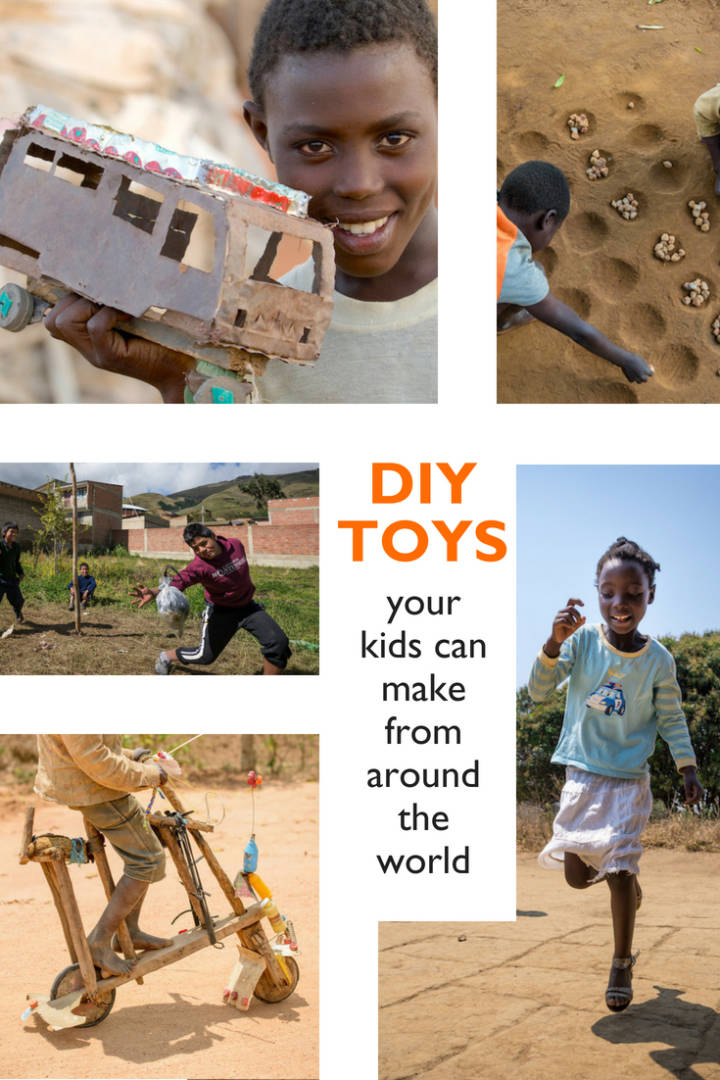
10. Family activity: DIY toy build
Most kids living in poverty don’t have many toys, but that doesn’t stop them from playing. They make toys out of what they find. The goal of this family activity is to be grateful for what you have. What you’ll need:
- 10 items picked by your kids from around your house or outside (that aren’t toys)
- Tape
- Scissors
- Markers
Play the game with your family
Gather 10 items you can recycle from around your house or outside that aren’t toys, i.e. plastic bags, empty paper towel rolls, empty milk cartons, cardboard boxes.
Once you’ve gathered your supplies, ask your kids: How many toys do you have? Do you think you have enough toys? How many toys did you ask for last Christmas or on your birthday?
Then brainstorm together: How many toys can you make out of them? What kinds of new games can you make with them?
Need inspiration? See what other kids around the world do for toys or try this tutorial for making a soccer ball.
Play it forward: What did you learn?
Creating your own toys means you activated your creativity. Building them took cooperation. What special talents do you see in your family? Take turns telling everyone in your family what talents you appreciate about them. Then take a minute to think of five things you are grateful for, and share them with your family.
Pay it forward by helping your kids clean out their toys and donate the ones they don’t use anymore to Goodwill. You can also donate to give soccer balls and new toys to kids who don’t have them.
“Rejoice always, pray continually, give thanks in all circumstances; for this is God’s will for you in Christ Jesus.” —1 Thessalonians 5:16-18
Kids who changed the world — and themselves
Think your family can’t change the world? Think again. Real stories:
![Caleb, now 11, from Colorado, read about kids his age who didn’t have clean water to drink. He decided to run for them – one mile at age 8, 5K at age 9, and a half marathon at age 11. “Some days I didn't want to get up [to train]. But then I'd think about kids who had to get up and walk, carrying heavy water." He’s raised over $45,000 to bring clean water to kids around the world.](https://wvusstatic.com/email/met3/spacer.gif) Water warrior: 11-year-old Caleb
Water warrior: 11-year-old Caleb
“About three years ago, my parents started talking about kids in Africa, kids who walk miles and hours to get water for their families. This water isn’t even clean. It’s the kind you wouldn’t wash your dog with, but it’s all they have,” says Caleb. “If there’s anything I can do to help other kids, then I want to do it.”
At the time, Caleb was 8. His parents were running a marathon with Team World Vision to raise funds for clean water projects. He started with a 1-mile run. When he turned 9, he ran a 5K with his grandfather, age 69 — the first time for both.
“This past year, I made one of the craziest decisions of my life. I wanted to run the half marathon, which is 13.1 miles” says Caleb. “At first, my parents said no, but then I convinced them. Running a half marathon means training every single day. Some days I didn’t want to get up. But then I’d think about kids who had to get up and walk, carrying heavy water.”
Caleb also convinced five of his friends to run with him. “The race was fun and exhausting. But the best part was the outcome: I raised over $45k.”
And he’s already planning to race next year!
Making a stand: 11-year-old Tyler
Tyler is a kid with big dreams of bringing clean water to communities in Africa. And his dreams are turning into reality through his lemonade stand.
His story begins back in September 2011, when the mailman delivered the World Vision Gift Catalog; he read it cover to cover. The next morning he brought the Gift Catalog to his mother and told him he wanted to help bring clean water to people in Africa.
“I could not believe people did not have enough clean water to drink,” says Tyler. “It comes straight out of my faucet!”
With his first lemonade stand, Tyler raised $400. But his lemonade stand is forever evolving with new ideas and causes. To date, he has raised more than $19,000. His goal is to raise $50,000.
“I want to show God’s love to a hurting world,” says Tyler. “I want to do something — something life-changing — and I would like you to join me.”
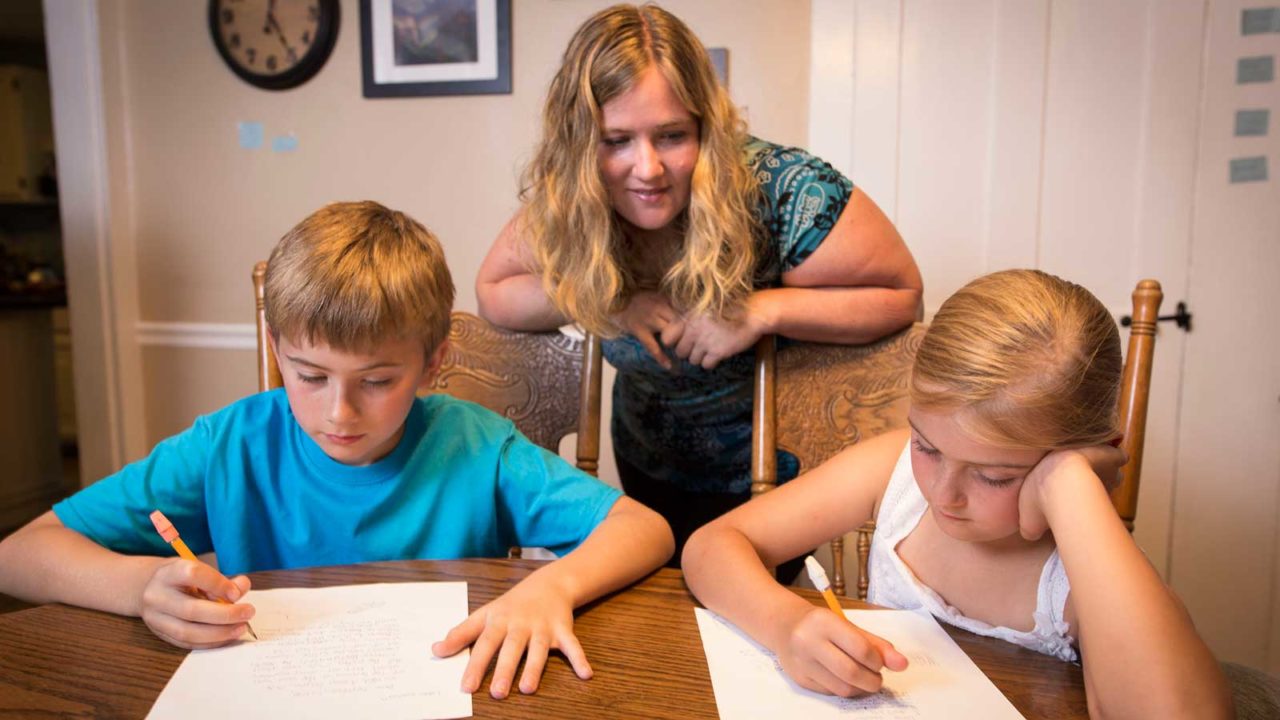
Advocates in action: 11-year-old Lukas and 9-year-old Adelaine
When Anna Goodworth taught her children about slavery in their homeschool history class, Adelaine and Lukas, then 5 and 7, asked if slavery still exists. Anna told them about human trafficking and child labor, a modern form of slavery, and that even the things they bought could be made by exploited children.
“My son said he wanted to do another Boston Tea Party and take everything they had that was made by slaves and throw it in the river,” says Anna. “Instead of getting arrested, I opted to have them write a letter to the president and our [members of Congress].”
A few months later, the family visited Washington, D.C., and met with their congressional members, including Rep. Elizabeth Esty. They spent time with World Vision staff discussing how to advocate for a bill. They urged Rep. Esty to consider legislation that addresses human trafficking. Back home, the children followed up with thank you notes.
A year later, Anna received an email from Rep. Etsy’s office, explaining that the family’s visit inspired her to back the anti-trafficking bill — which is now law. “It’s different when kids are speaking out for kids,” Anna says. “They can say, ‘They’re just like me — they’re the same age as me.’ It’s been very empowering and humbling.”

Globe trotters: 13-year-old Jonah, 11-year-old Mia, and 8-year-old Olivia
Matthew and Lisa Owens, both teachers, wanted their children to experience the world. So the couple took a leave of absence from their jobs and spent a year traveling. They created assignments for the children along the way, and the world became their classroom. The point wasn’t only learning about other cultures. It was also deepening friendships they’ve been making for years.
The family sponsors children around the world with the same birthdays as Jonah, Mia, and Olivia. “To be able to connect with an actual person brings it to a heart level,” Lisa says. “When our children’s birthdays roll around, we’re also praying for this other child. When their photos are coming to us, we’re constantly looking at it from the lens of our own child’s life as well.”
Visiting their sponsored children in Bolivia, India, Eswatini (Swaziland), and Zimbabwe gave the family unforgettable shared experiences and a first-hand glimpse of God at work in the world. “Rather than look at a picture and say, ‘Oh, here’s a poor kid from the other side of the world. My job is to give them money,’ instead, it’s seeing the wholeness of this child,” Lisa says. “They’re loved. They’re loved by their family, their community, and they’re loved and provided for by God.”
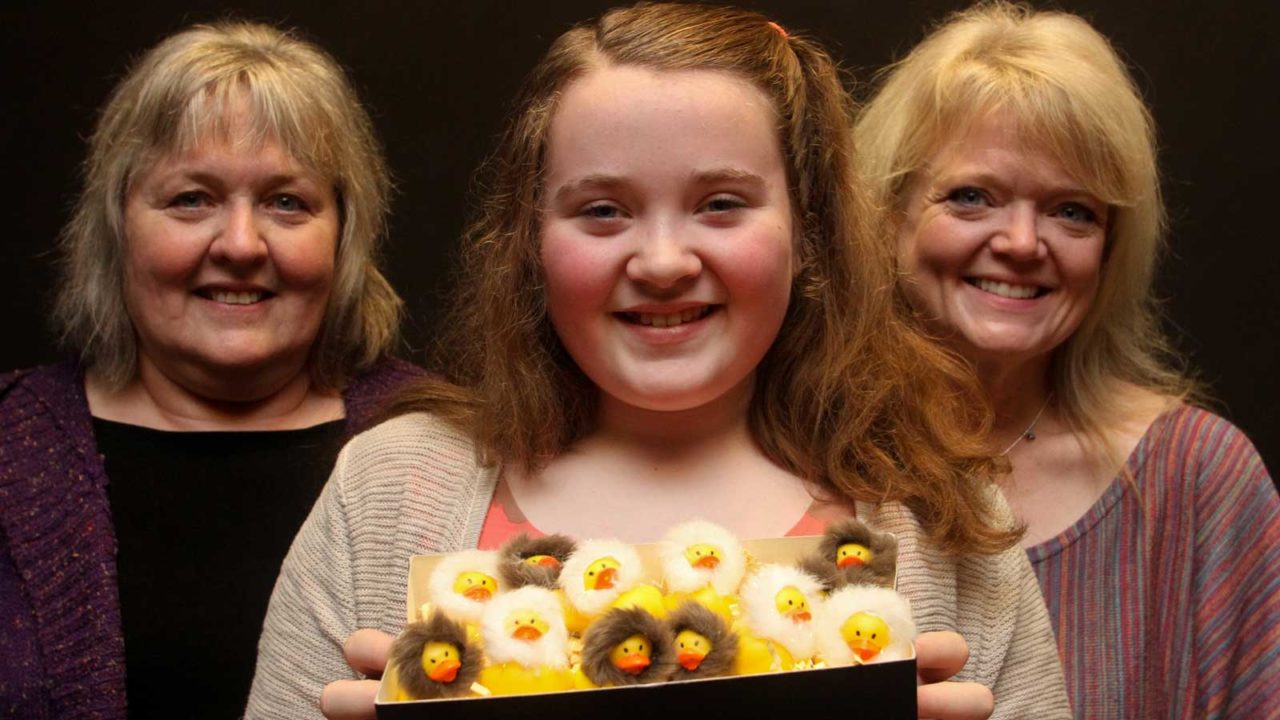
The new duck dynasty: 13-year-old Camille
Camille Varner was 6 when she began decorating Alaska-themed rubber ducks, wrapping them in cuddly parkas and selling them in her family’s soap shop in the heart of Juneau’s thriving tourist district. That was six years ago, and now the teenager is amazed at the impact this project has had on children in developing countries.
Her family uses profits from the rubber ducks to purchase live ducks through the World Vision Gift Catalog. Since 2010, the family has sold $3,275 worth of rubber ducks, enabling World Vision to give 500 live ducks to families in developing countries.
“I never would have imagined it would get this big,” Camille says. “I can see I’m actually helping people.”
The rubber duck story began in 2009 as a way to teach generosity to Camille, the youngest grandchild. Soon, the lesson turned into an annual tradition involving the whole family.
“We wanted her to know that life isn’t all about making money,” says Pat Stringer, Camille’s grandmother. “We just thought ducks fit with soap. God has just blessed it and blessed it.”
Some of these kids’ efforts may seem extraordinary. But they aren’t any different from your family. They took the time to learn about needs in the world, made a plan, and made it happen.
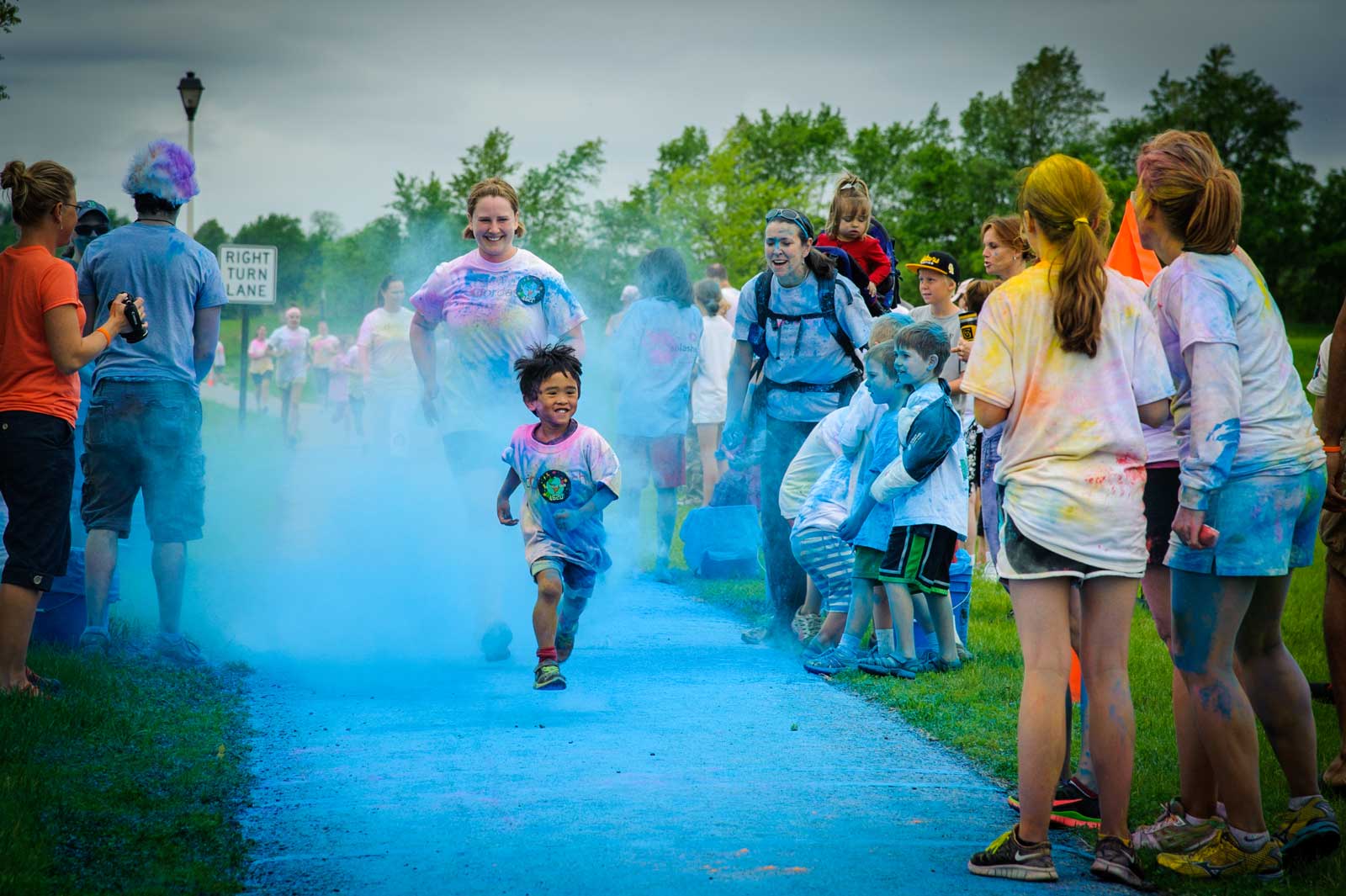
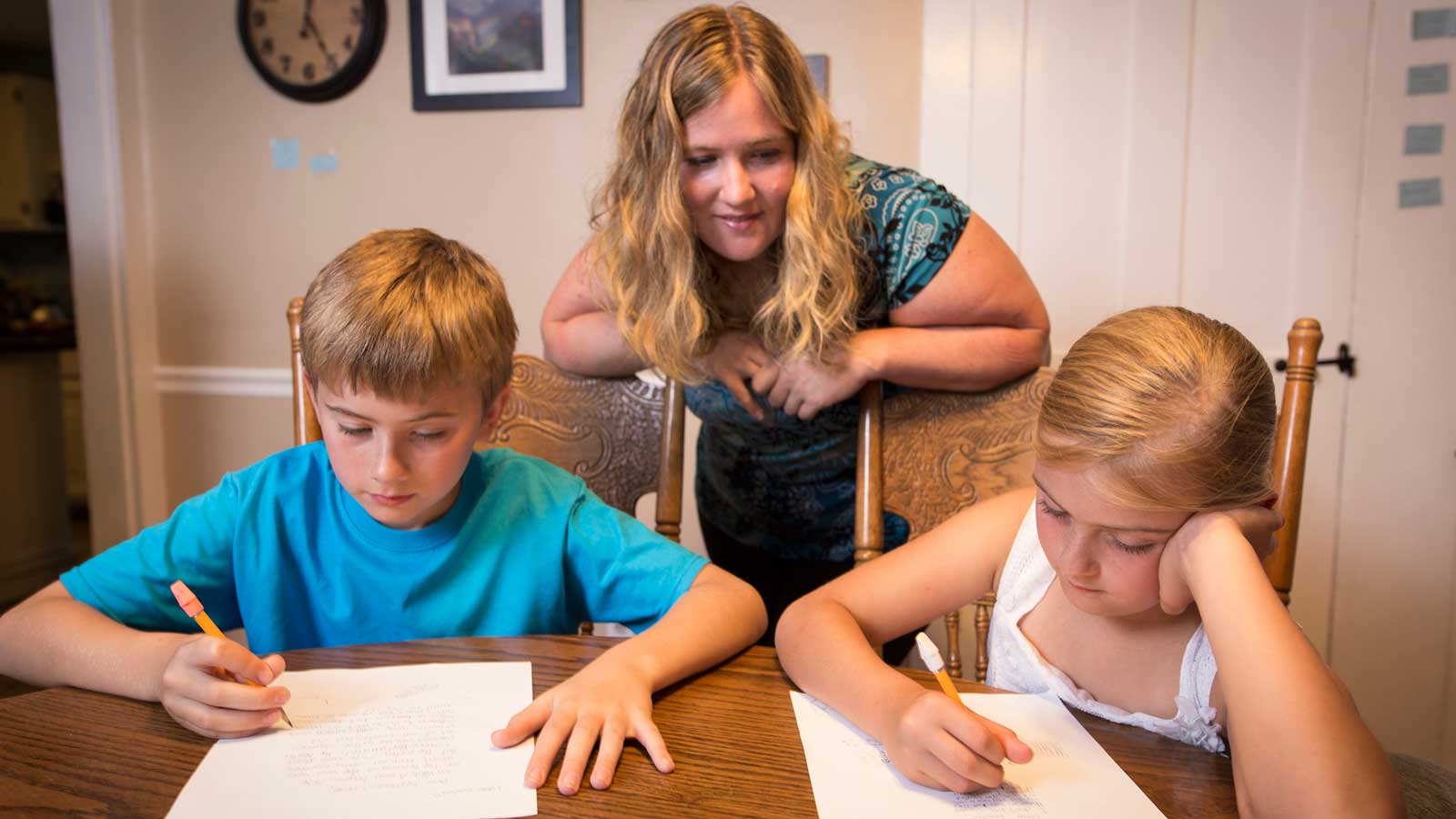
![Caleb, now 11, from Colorado, read about kids his age who didn’t have clean water to drink. He decided to run for them – one mile at age 8, 5K at age 9, and a half marathon at age 11. “Some days I didn't want to get up [to train]. But then I'd think about kids who had to get up and walk, carrying heavy water." He’s raised over $45,000 to bring clean water to kids around the world.](https://wvusstatic.com/www/uploads/Demand-Gen-Summer-Article-Little-Tsunamis-for-web.jpg)
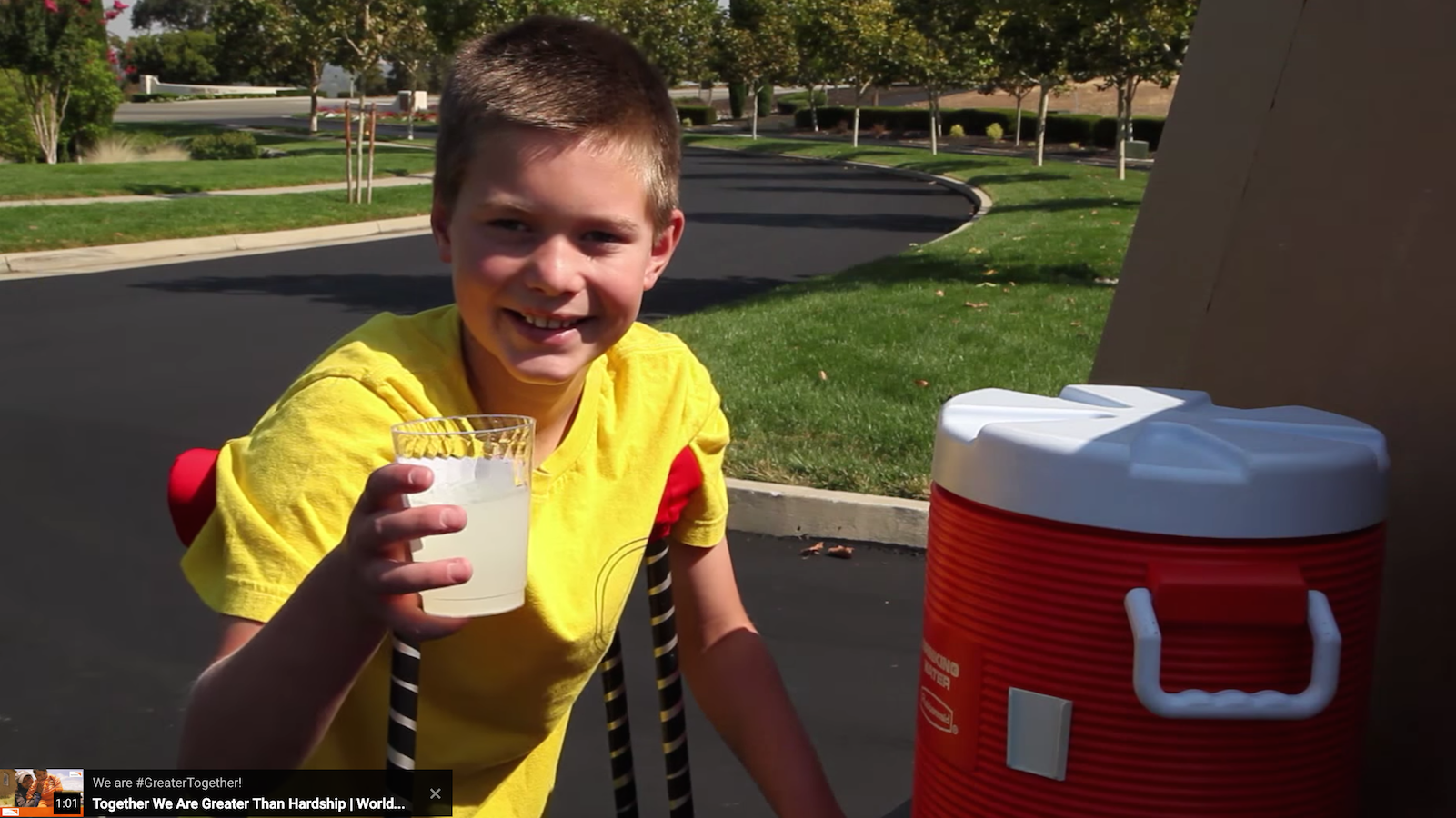
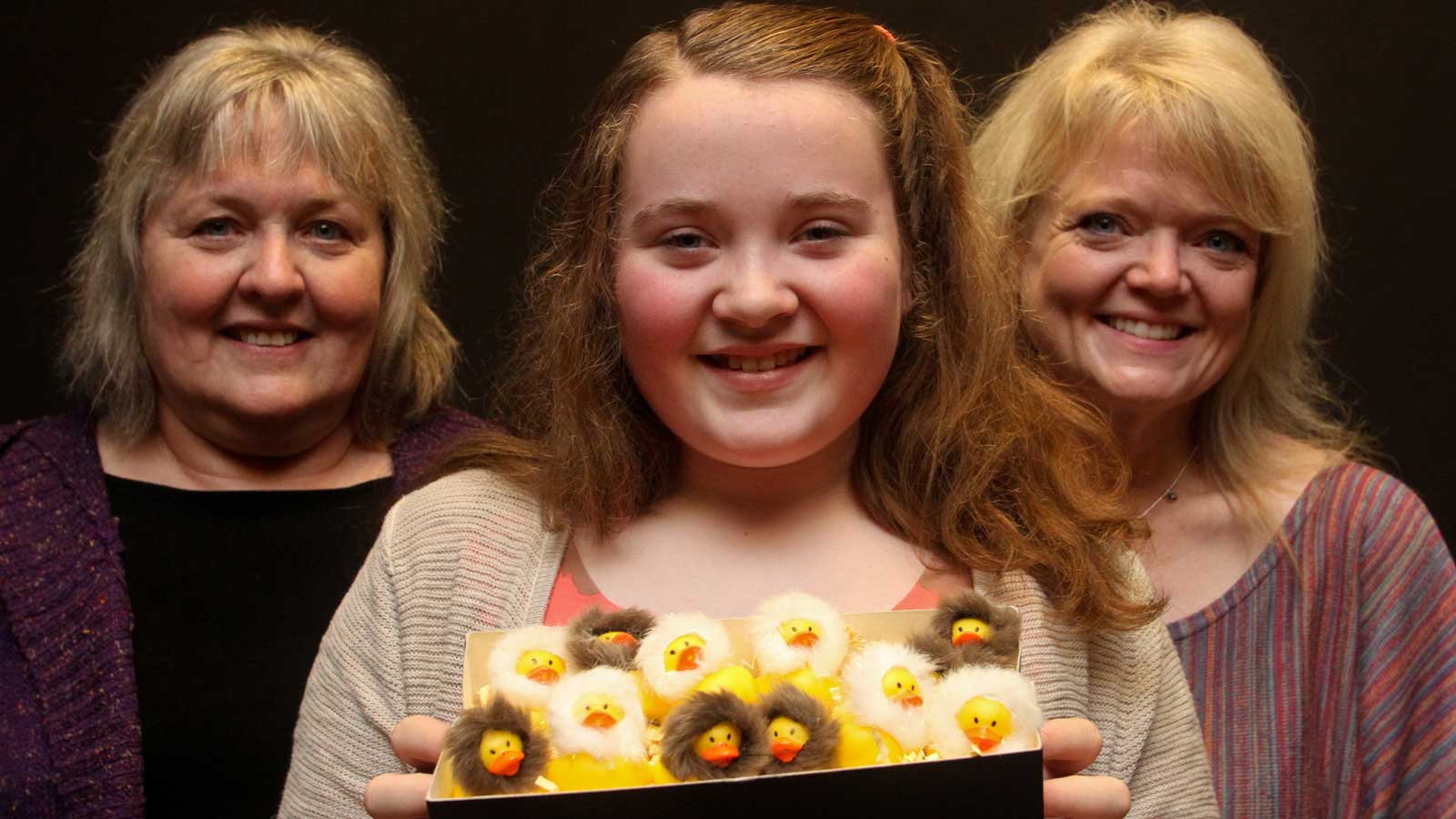
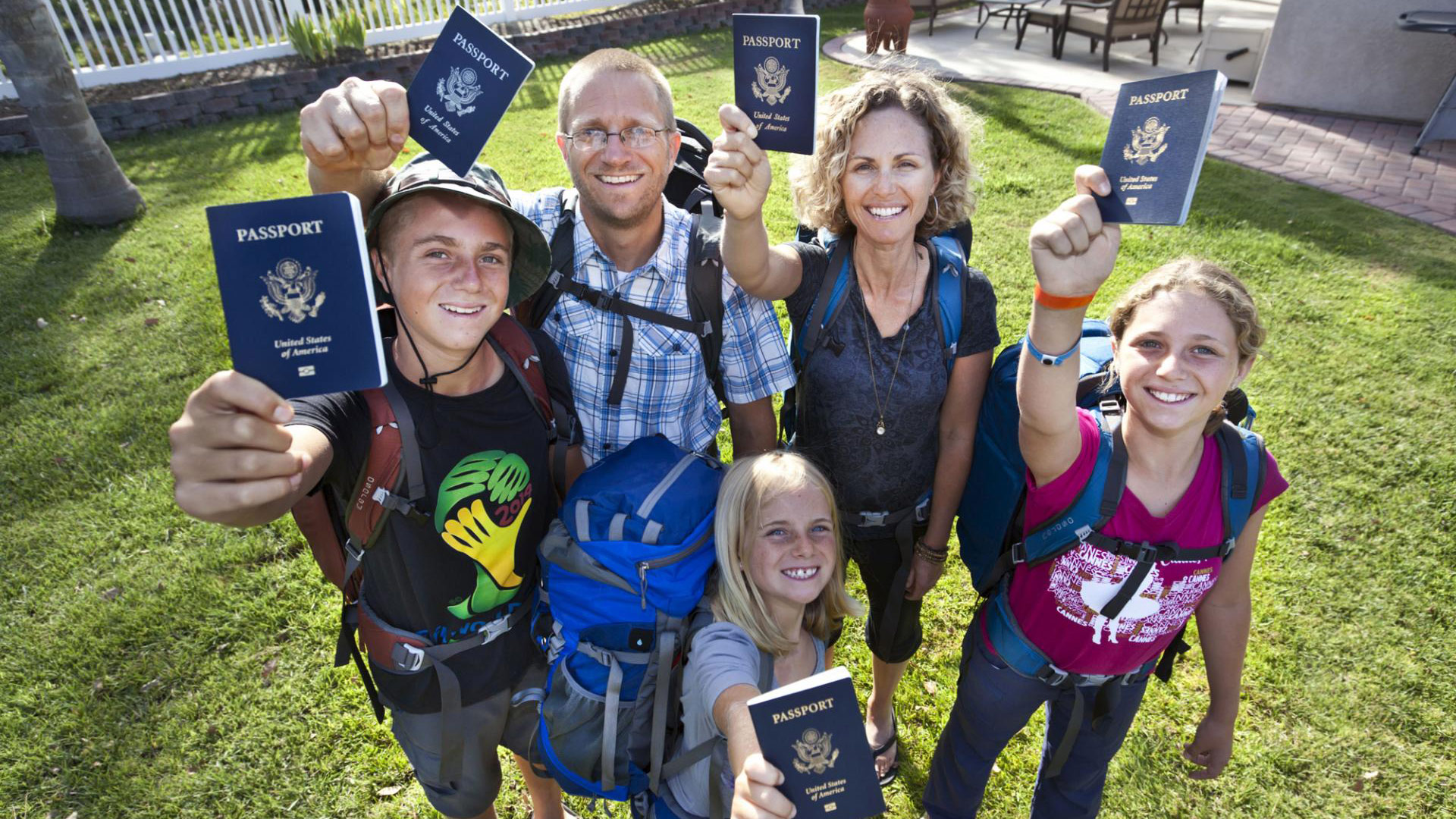
![Caleb, now 11, from Colorado, read about kids his age who didn’t have clean water to drink. He decided to run for them – one mile at age 8, 5K at age 9, and a half marathon at age 11. “Some days I didn't want to get up [to train]. But then I'd think about kids who had to get up and walk, carrying heavy water." He’s raised over $45,000 to bring clean water to kids around the world.](https://wvusstatic.com/www/uploads/Demand-Gen-Summer-Article-Little-Tsunamis-for-web-1280x720.jpg) Water warrior:
Water warrior: 